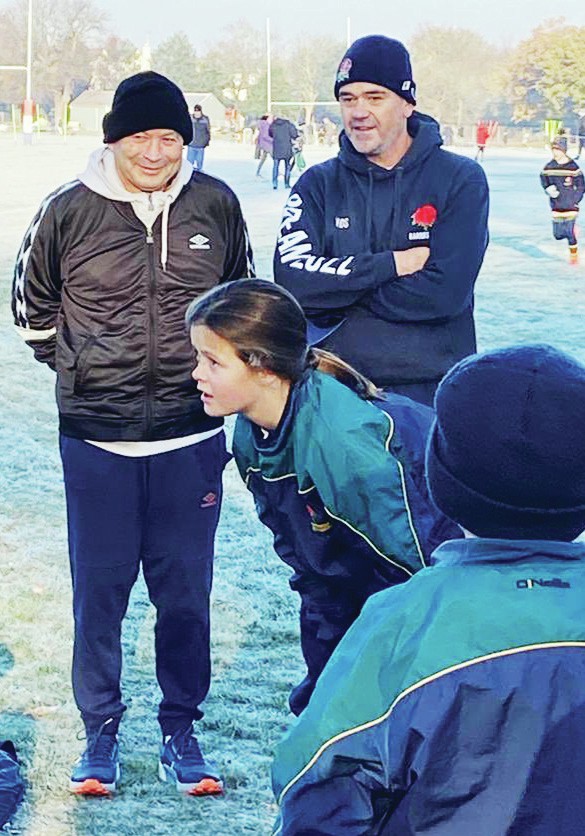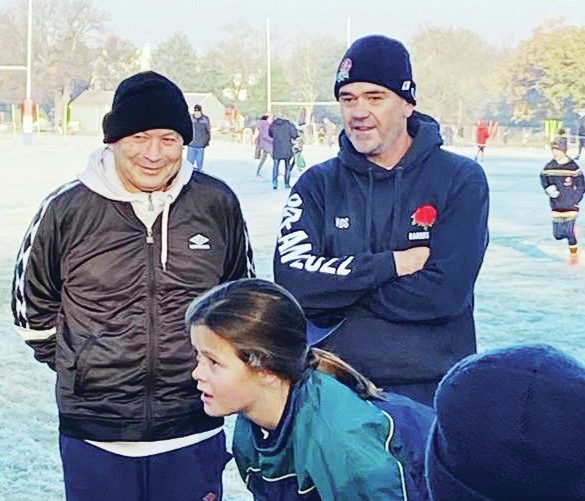A FRONT ROW VIEW OF THE GAME

With Eddie gone it is now time to expect the old ideas and calls for change to be aired once again. Although Eddie is not quite gone yet (even though he has left the RFU) he has been busily making an effort to leave a legacy that will be very different to the one that many England fans and pundits have unfairly chosen for him.
It appears Eddie has not only taken time out from coaching England to give some guidance to teams in Japan, it has now emerged that he was doing the same here, particularly with the youth sections of some grassroots clubs. Eddie certainly didn't publicly make the most out of these sessions, but it seems it was something personal to him, while giving lifelong memories to those youngsters he coached.
As for the senior game, it shouldn't be a surprise that we haven't heard a bad word from any of those who were part of Jones's squads. It could be that Jones took a lesson from Clive Woodward and made all his players and assistant coaches sign a non disclosure agreement, thus stopping anyone giving us a true picture of what it was really like under Eddie Jones.
Jones called in a lot of players during his time, with many just having a taste of the squad and then ousted, never to know what it feels like to make the grade.
There were also lots of rumours of over training, bullying and favouritism during his tenure, even from the Premiership clubs but nothing has ever been substantiated and probably never will be.
It was interesting to read Lawrence Dallaglio in last week's Rugby Paper calling for a change in focus for the coach and team without the continual World Cup obsession that seems to have overtaken everything. It seems that Lawrence feels as if that has been the cause of England's bad results and Eddie's demise.
A coach should always have a focus on the long term and how to develop a winning team that will win you whatever competition you enter, including the World Cup, which is after all the premier event in the sport. Jones was certainly not the only coach to be seduced by what a World Cup win can bring and focus all his attention on trying to make it happen.
However, players have a different perspective and that is to win or at least play as best you can in every game so that you remain in the international squad and at the top of the game. That way you will expect be picked for a World Cup. Imagine being a player who breaks into the squad for a couple of seasons but then falls foul of a change of tactics and is left out of the World Cup squad? It would be devastating.

That said, winning a World Cup is still the only competition which gives a coach and his squad that global recognition they all seek, which drives a mass influx of new players at all levels.
Until the World Cup any successful side in rugby were not really officially recognised, in fact if any award was made for the team's achievements it only went to the captain. That's why a team captain who was awarded an OBE would often see it defined by the rest of the team as Other Buggers Efforts.
However, when England won in 2003 everybody in the squad and even support staff were awarded an honour (MBE, OBE etc.) with a visit to both Downing Street and Buckingham Palace.
It wasn't just rugby that failed to recognise success, think of football with Alf Ramsey and his squad winning in 1966 having to wait over 40 years to have what they did officially recognised. While Woodward and his squad in 2003 are still regarded as one of, if not the best England rugby team ever, despite their rapid demise in the months after that great win.
However finishing third in the 2004 Six Nations just three months later may well have ‘encouraged' some of those involved to walk away while remembering that old adage, ‘you're only as good as your last game.'
As Lawrence well knows, it's winning a World Cup that gives you lifelong fame, particularly if nobody else from your sport can repeat it in your lifetime. Any other competitions just don't measure up for some reason. Despite the fact that it may be even harder to achieve a constant success in them.
Meanwhile, in The Rugby Paper last week, Nick Cain called for the return of Clive Woodward and blames a lack of interest in that idea on the fact that Woodward had burned his bridges with the RFU, but that is far too simplistic.
Yes, it's true Clive did point out a number of things that the RFU were doing wrong in terms of providing the right environment to get and keep a winning team. Nick seems to forget that he still took control of the Lions tour in 2005 and failed, resulting in a 3-0 series loss after he had left the RFU.
In many ways, the role that Nick is seeking for Woodward has already been filled by both Conor O'Shea and Nigel Redman who have been working in coach development with the RFU for ages.
Truth is, I don't think Woodward would want to go back to the RFU after over 16 years out of the game, as so much has changed that it is likely that he would not necessarily be able to follow his own path.



























